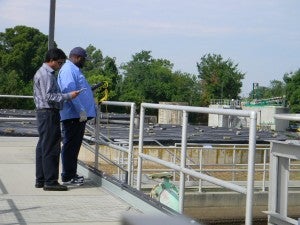EDF Staff | August 12, 2011
 By: Mohammad Sayemuzzaman, 2011 Climate Corps Public Sector Fellow at Elizabeth City, NC; PhD candidate at North Carolina Agricultural and Technical State University
By: Mohammad Sayemuzzaman, 2011 Climate Corps Public Sector Fellow at Elizabeth City, NC; PhD candidate at North Carolina Agricultural and Technical State University
As an EDF Climate Corps Public Sector fellow at Elizabeth City in North Carolina, I spent five weeks finding ways to reduce energy waste at the city's waste water treatment plant, which serves 20,000 people. I asked myself, "Why do we spend so much money to process waste? And can we cut energy usage while meeting state and federal regulations for waste treatment?"
As the first and only EDF fellow at a waste water treatment plant, I had to lay the groundwork for future fellows: Read and understand the federal regulations, gather plant design blueprints, make a list of the special equipment, and determine the baseline energy usage. I interviewed the director of the Public Works department, the plant manager, the head of operations, and the energy officer. I learned that the plant's motors and pumps are the most energy intensive parts, adding up to 85-95% of total electricity usage. I identified two giant motors and six pumps that run 24/7, which make up 60-70% of total energy usage. I found cost and energy savings by finding ways to make these motors and pumps run more efficiently and having a few go offline when they're not needed.
In addition to the plant, I also investigated Elizabeth City's Parks and Recreations Center and the Senior Center, built in 1976 and 1991. Since the centers were built, there haven't been any upgrades on lighting, insulation, or HVAC. These facilities are very popular with the city's residents and provide social outlets for teenagers and senior citizens. There are basketball games every two weeks in the Recreation Center's 12,000 square feet gymnasium. My challenge involved planning the installation of an energy efficient HVAC system at the gym, while making sure people stayed comfortable. As for the lighting, the high bay lights in the gym had the biggest potential for energy and cost reduction. Both centers also can benefit from entire upgrades to energy efficient lighting.
With the training from EDF, support from Elizabeth City's staff, and help from an amazing EDF Climate Corps Public Sector staff, I found many ways to cut greenhouse gas pollution, trim electricity bills, and pave the way for energy efficiency at a waste water treatment plant. I'm looking forward to finding more savings for Elizabeth City.
EDF Climate Corps Public Sector (CCPS) trains graduate students to identify energy efficiency savings in colleges, universities, local governments and houses of worship. The program focuses on partnerships with minority serving institutions and diverse communities. Apply as a CCPS fellow, read our blog posts and follow us on Twitter to get regular updates about this program.